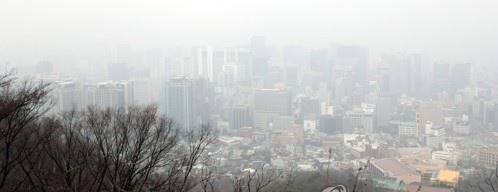Nearly 6 in 10 Koreans are in favor of suspending coal-fired power plants to reduce particulate pollution from autumn through spring, even if it is accompanied by a hike in electricity rates, a survey showed Sunday.
 |
(Yonhap) |
According to the poll of 2,000 Korean adults by a national anti-fine dust body, 78.3 percent of the respondents approved of enforcing a seasonal dust management system between December and March, when Korea typically sees high levels of PM 2.5 -- -- ultrafine particles smaller than 2.5 micrometers in diameter.
The seasonal dust management system was suggested by the National Council on Climate and Air Quality in September, under which stronger measures are taken to curb hazardous particulate pollution.
Under the system, a crackdown on illegal emissions would be toughened, coal power plants -- up to 27 in spring and up to 14 in winter -- would be shut down, and over 1 million aged diesel vehicles would be restricted from cities during the four-month period.
According to the survey, 73.5 percent of the respondents were in favor of restricting old diesel cars from the center of cities and 69 percent were in favor of halting the operation of coal-fired power stations to reduce the levels of PM 2.5.
Some 56 percent of the surveyed agreed to a rise of 1,200 won in monthly electricity prices, which could come with the suspension of the coal-fired power stations, the survey showed. Some 21 percent disagreed to it.
Korea largely depends on coal-fired power plants to meet electricity demands, and the Moon Jae-in administration’s push to reduce reliance on coal power and transition toward renewable energy has long met with opposition from those concerned about an increase in electricity rates.
Nearly 39 percent of the respondents said that the government has been “wrong” in terms of international cooperation to tackle the particulate pollution, while 20.8 percent said the government has been doing “well.”
Most respondents favored a diplomatic solution -- such as bilateral or multilateral cooperation or signing of an international convention -- (40.3 percent), followed by strong demand for the source of toxic pollutants to reduce them (34.5 percent) and a reduction of domestic emissions first. (17 percent.)
In the mid- and long-term, the surveyed preferred sustainable development considering the environment and future (78.4 percent) rather than rapid economic development (14.6 percent), according to the survey.
Typically, Korea suffers from high levels of PM 2.5 from autumn through spring, as wind blows from west to east. Pollutants traveling from China as well as domestic emissions from old diesel cars and coal-fired power plants are believed to be major contributors.
The survey was carried out online between Oct. 29 and Nov. 6 by local pollster Nielsen Korea at the request of the National Council on Climate and Air Quality and the Ministry of Culture, Sports and Tourism.
(
laeticia.ock@heraldcorp.com)







![[Today’s K-pop] Blackpink’s Jennie, Lisa invited to Coachella as solo acts](http://res.heraldm.com/phpwas/restmb_idxmake.php?idx=644&simg=/content/image/2024/11/21/20241121050099_0.jpg)
